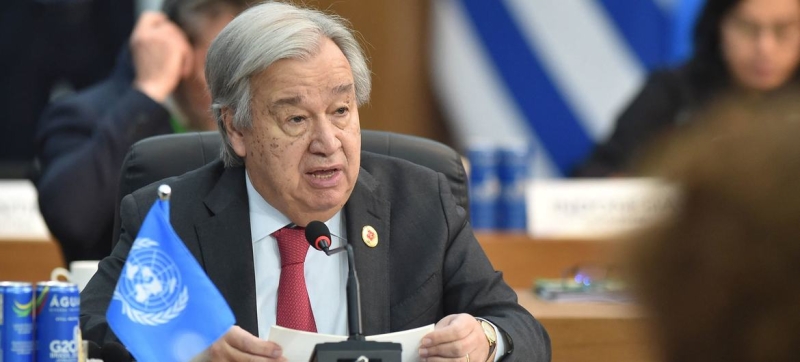
UN chief at G20 summit in Brazil. UN chief at G20 summit: Global problems require urgent action Climate and environment
UN Secretary-General António Guterres called on world leaders at the G20 summit in Rio de Janeiro, Brazil, to take decisive action to combat the climate crisis and reform global institutions. He stressed that issues of sustainable development and changing the global governance system require joint efforts.
Climate Change: ‘The Point of No Return Is Near’
Guterres noted that the world is on the brink of a climate catastrophe. “We have reached a tipping point for the climate,” he said, adding that continuing with current policies will lead to a global temperature increase of more than 3 degrees Celsius. This will have catastrophic consequences for the economy and people’s lives.
The UN chief called on countries to reduce global greenhouse gas emissions by 9 percent annually this decade.
“Unfortunately, emissions continue to rise. We need to accelerate a just transition from fossil fuels to renewable energy,” he said.
Guterres stressed that renewable energy is already the cheapest source of electricity in many countries.
“The end of the fossil fuel era is inevitable. We must ensure that it happens on time,” he added.
The Role of the G20
The Secretary-General paid special attention to the role of the G20 countries, which are responsible for 80 percent of global emissions.
“New national climate action plans must be ambitious, include all sectors and types of greenhouse gases, and be consistent with the 1.5 degrees Celsius goal,” he stressed.
Guterres welcomed the initiatives of Brazil and the United Kingdom, which recently updated their climate commitments. However, he stressed that the efforts of individual countries are not enough: “All countries must do more. And developed countries have a responsibility to support developing economies.”
The Need for Global Governance Reforms
Moving on to the issue of reforming global institutions, the Secretary-General pointed to the growing crisis of trust and the deficit of effective governance in the international system. “Poverty, inequality and the climate crisis are worsening, and peace is becoming increasingly out of reach,” he said.
One of the key tasks, according to him, is to reform the UN Security Council.
“The Council is losing its effectiveness and legitimacy, unable to stop wars that harm innocent people,” Guterres noted.
Financial reforms
He also stressed the need to modernize the international financial architecture. The UN chief called on the G20 countries to ensure fair representation of developing countries in the governance of financial institutions and to create a reliable global protective mechanism. “Financial system reform must take into account countries’ vulnerabilities, not just their GDP,” he added.
Guterres proposed concrete steps, including increasing the capital of multilateral development banks, enhancing their lending capacity and reviewing the international tax system.
Artificial Intelligence and the Digital Future
The Secretary-General concluded his speech by addressing the issue of regulating artificial intelligence, noting that the recently adopted Global Digital Compact includes universal principles for the governance of AI.
“We need to advance the global dialogue on this issue and ensure access to technology for developing countries,” he said.
Guterres stressed that the success of the proposed reforms depends on developed countries: “The world is looking at you. It is in your hands that the key to solving many of these problems lies.”
